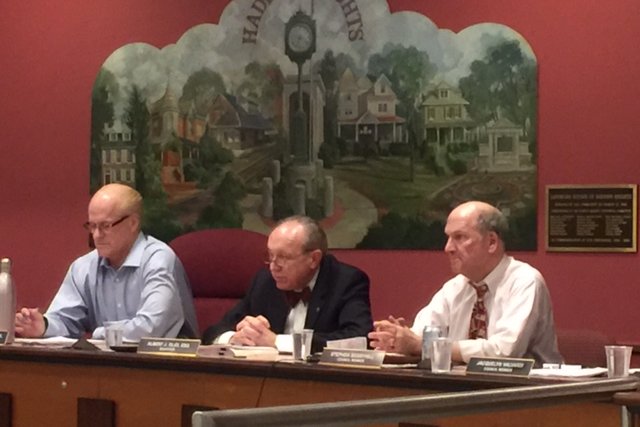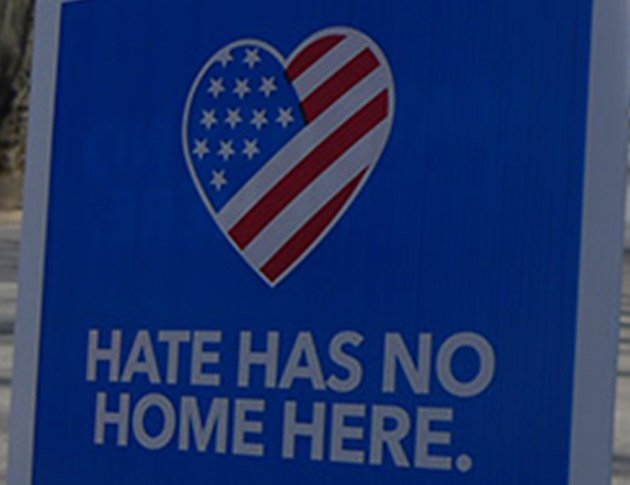
April 04, 2017
 KEVIN C. SHELLY/PHILLYVOICE
KEVIN C. SHELLY/PHILLYVOICE
From left, Haddon Heights Mayor Jack Merryfield, solicitor Albert Olizi and councilman Stephen Berryfield began Tuesday night's council meeting with profuse apologies for allowing zoning violation warnings targeting 'Hate has no home here' signs to go out to 10 residents. Olizi said the sign ordinance is outdated and likely violates free speech protections. The zoning and planning boards will review and revamp the law, the officials said.
Haddon Heights officials began a borough meeting Tuesday night by apologizing, deeply and repeatedly, for sending out zoning violation notices to some residents with “Hate has no home here” signs on their lawns.
Councilman Stephen Berryhill said the town’s zoning official, Ron Newell, acted on a citizen complaint about the signs. Berryhill did not identify the person who called in the complaint.
He also could not say how Newell picked the 10 property owners to receive warning letters, other than to say the zoning officer could not have contacted all residents in violation of the sign rule in just one day. A decades-old regulation permits signs to stay up no longer than 21 days.
Some have suggested politics were at work, but the councilman said that’s not the case.
While Berryfield conceded that only the “no hate” signs were hit with violation notices, he said 15 signs for construction and services were pulled by Newell on the same day, primarily because they were in curbside right-of-ways.
“I apologize if anyone feels they were unfairly treated,” said Berryhill, supervisor of the zoning office and a lawyer by profession.
Conceding he was not consulted and that he was also not familiar with the law as it is written, Berryhill said, “I wish it had come to me.”
“I also wish we would try and fix things before we go to the newspapers or the press. That’s best," he said. "But that’s not what happened."
The councilman told a crowd of about 50 residents that he personally does not like signs dotting lawns and would “like to get rid of them,” but admitted that would be a free speech issue.
“For some, this had a political edge ... I don’t want to see signs that say ‘build a wall’ or ‘lock her up,'” said Berryfield, adding “whatever the law says, we will comply.”
For his part, the borough's mayor, Jack Merryfield, accepted blame for approving the notices after having read the content proposed by Newell.
“He was doing his job. He was following an ordinance,” Merryfield said, adding the language of the ordinance is 37 years old and in need of revision.
“There was no political aspect,” said Merryfield.
The audience was mixed, with one resident, Michael Barrett, saying he opposed signs that “insinuate” there is hate in a neighborhood.
The “Hate has no home here” signs have appeared on lawns across the Philadelphia region.
But more residents came forward to defend the signs, saying the message is simple, straightforward and apolitical.
While Barrett got polite applause, the audience more passionately supported speaker Meredith Roeber, who said she had not planned to speak until she heard Barrett.
Roeber said her own yard sign was taken from her lawn the night before Newell put out violation notices last week. She has since replaced the sign.
“I’m not entirely buying” that there was no political motivation behind who received the violation notices, she said.
After the meeting, Barrett said that reading the signs as apolitical is “disingenuous." He said the signs “popped up” near him around the time of the first Trump travel ban.
“Hate is an extreme word. That’s the problem. It cuts off the conversation. I deserve a safe spot and that’s what my home is,” he explained.
Roeber strongly refuted Barrett’s assertions about her own motivations. “The sign on my law says there is no hate in my home,” and makes no inferences about hatred in others, she said.
Indeed, that’s what the organization which first began placing the "Hate has no home here" signs in a Chicago neighborhood also said via email.
“Certainly, we do not wish to encourage anyone to display our signs in a manner that interferes with municipal or other regulations and we absolutely respect the rights of communities to establish their own guidelines about these things, so long as they are applied fairly and uniformly,” said Carmen Rodriguez.
“We’re hopeful that the positive spirit of our message will be evident in how folks ultimately resolve the issue. Surely with all the important issues we face, we can arrive at a reasonable compromise on displaying a message of acceptance and patriotism,” she concluded.
City officials said they plan to have both the zoning and planning boards review the current ordinance and adopt new sign regulations in the near future.
 PhillyVoice/Staff
PhillyVoice/Staff